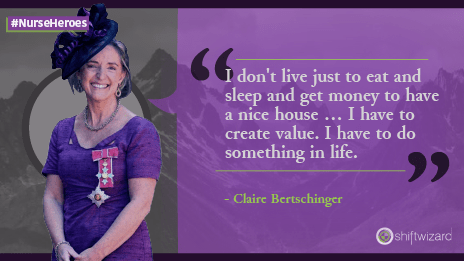
Born in 1953 in Essex, Bertschinger had a Swiss father and a British mother. It was this dual nationality that would later allow her to travel to war-stricken countries to offer them aid. However, her early years didn’t show much promise. She was dyslexic, meaning that she could barely write or read until the age of 14. However, that didn’t stop her budding intelligence or desire to help others.
After watching the film, The Inn of the Sixth Happiness during her teens, she developed an intense desire to get into nursing. In the film, a character named Gladys Aylward goes to China in the 1930s to offer aid and is swept up in the Japanese invasion. It was then that she knew this would be her future career.
To follow that career path, she attended nursing training in the United Kingdom and worked for a while to gain her bearings. Eventually, she earned a spot as a medic in Operation Drake, an expedition that was journeyed to Panama, Sulawesi, and Papua New Guinea.
Inspired and wanting to do more, she became a part of the emergency disaster relief group of the International Committee of the Red Cross upon her return. This position allowed her to visit a number of war zones and offer medical care, including places like Liberia, Sudan, Afghanistan, Lebanon, Kenya, Sierra Leone, and the Ivory Coast.
However, her most famous nursing campaign took place in Ethiopia in 1984. She was working in Mekele, the capital of the Tigray Province, to help distribute food to children during a massive famine. Unfortunately, the feeding center did not have enough supplies or space to go around, meaning that only 60 to 70 children at a time could be taken care of. This left thousands to die, as they had no other sustenance. It was up to Bertschinger to decide who would get food and who wouldn’t, a choice that haunted her to the extreme. In interviews, she said that “it breaks [her] heart” and it made her feel “like a Nazi commandant, deciding who would live and who would die.”
In an effort to rectify the situation, she partnered up with Michael Buerk, a reporter with BBC News. She persuaded him to broadcast the problem to the world and ask for donations and help. The story was broadcast on October 23, 1984, and instantly touched the hearts of people across the world. In fact, it’s what inspired Bob Geldof to launch Band Aid, which featured a variety of British music stars coming together to produce music for the charity. In 1985, Live Aid soon followed, which helped to raise over 150 million pounds as well as about 2 million lives throughout Africa.
Because of her efforts to both International Humanitarian Aid and Nursing throughout the years, Bertschinger was named a Dame Commander of the British Empire by the Queen in 2010. She’s also earned honorary doctorates from a number of different universities throughout the years. In 1991, she got the coveted Florence Nightingale Medal from the International Committee of the Red Cross for her continued efforts in areas where people are affected by disaster and conflict.
While Bertschinger no longer works in the field today, that doesn’t mean she still isn’t contributing to the field of nursing. She is continuing her nursing career by working as the Director for the Diploma in Tropical Nursing at the London School of Hygiene and Tropical Medicine, where she can hopefully help other nurses follow in her footsteps.
Not every nurse can have the dedication and motivation to work as Bertschinger did. It takes fortitude and strength to work in the midst of war zones and natural disasters. However, by doing so, nurses can have the biggest impact on the world and truly make a difference.
Read More:
Recognizing the Signs of PTSD in ED Nurses
CNOs on Preventing Burnout and Other Thoughts